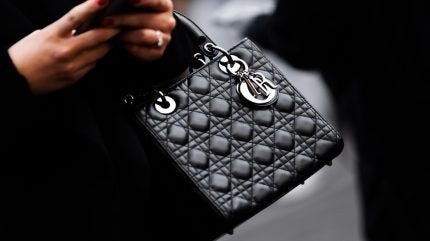
In June, Dior SRL, an Italian subsidiary of LVMH which manufactures luxury leather goods, was placed under administration by a Milan court following accusations of mistreatment of workers.
The Wall Street Journal reports foreign workers were employed to produce handbags and other products, working in conditions that allegedly “fall far short of legal standards”.
‘Made in Italy’ is often seen as a marker of quality with 2023 report published by Pambianco-PwC estimating that 78% of luxury fashion are made in the country. However, these allegations suggest that even in luxury fashion, traceability of the full supply chain remains key.
Workers were allegedly using machines with safety devices removed to increase productivity. Some were found sleeping and eating at the factory with employees working long shifts, including on weekends and national holidays.
The publication claimed the workers were paid around €2 ($1.08) to €3 ($3.25) an hour, far lower than the minimum level agreed in the sector through collective bargaining.
It also alleged Dior was paying a supplier for assembly of the products, with the work then outsourced to the factory at the centre of the allegations. The manufacturer was said to be charging Dior €53 ($57) for a handbag which was later sold by the brand for €2,600.
The prosecutors claim the factories were supplying further fashion brands as well.
While the brands themselves do not face charges related to the factories, the court has criticised the companies for failing to fully monitor their supply chains.
How has LVMH responded?
LVMH had not responded to Just Style’s request for comment at the time of going to press.
However, during LVMH’s public call to investors this week for the announcement of its latest financial results, chief financial officer Jean-Jacques Guiony said “we accept full responsibility for what happened” and will accelerate plans to integrate Dior’s supply chain.
However, he pointed out that LVMH “had no idea” about the situation as “it happened with the supplier of a supplier”.
But he admitted it doesn’t remove responsibility on LVMH’s side.
Guiony continued: “This being said, there is a big difference between being responsible and wilful misconduct and this was really something that we had no idea about.”
Guiony also told investors LVMH would “intensify” its audits on suppliers and increase vertical integration at Dior, which is currently at around 30% integration, compared to 60% at LVMH’s Louis Vuitton luxury fashion house.
“That’s not easy to do, but the current situation requires further investment on that front,” he added.
Why is this such an issue for luxury fashion?
Anja Sadock, head of marketing at traceability software provider TrusTrace told Just Style that fashion brands cannot be in control of their supply chains if they do not know them.
“You cannot improve what you cannot measure or quantify, and traceability data is key to understanding the state of brand supply chains, both from an environmental and social risk perspective, and to know where to focus and collaborate with suppliers to improve impact,” she explained.
“With the erosion of consumer trust, having robust data to back up claims is pivotal in restoring or building consumer confidence.”
GlobalData retail analyst Neil Saunders told Just Style that allegations surrounding labour conditions pose a particular threat to luxury brands.
“Because of their position in the market – and their high price points – luxury brands are held to much higher standards than mainstream or fast fashion companies,” he explained. “The idea of poor working conditions really jars with the pristine image of luxury.”
Saunders added there are also legal risks attached to such allegations, which could lead to fines and sanctions. “All these things worry investors and put pressure on management to make changes.”
Earlier this week news agency Reuters reported some LVMH investors, including European asset manager Amundi, have asked the company to take stronger steps to monitor their supply chains.
However, Saunders added that despite the risk of backlash from investors and law enforcement, consumers tend not to respond as strongly to these scandals.
“Interestingly, the filtering through to consumers is somewhat slower and less impactful. While most consumers disapprove of such practices, there is a degree of turning a blind eye when it comes to making decisions about which brands to shop with,” he suggested.
Last year rival luxury fashion conglomerate Kering released an updated sourcing policy for brands and guidelines for its suppliers. The framework aimed to provides suppliers with guidance on how to measure progress and outcomes on traceability, social welfare, environmental protection, animal welfare and chemical use.



